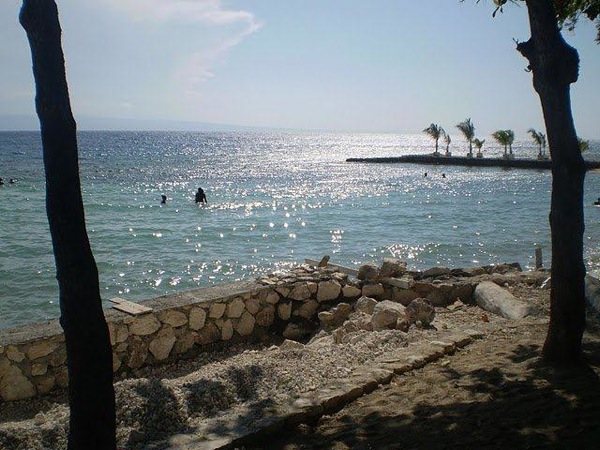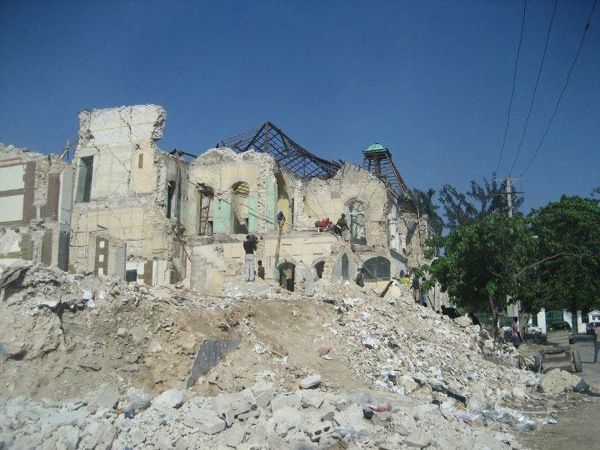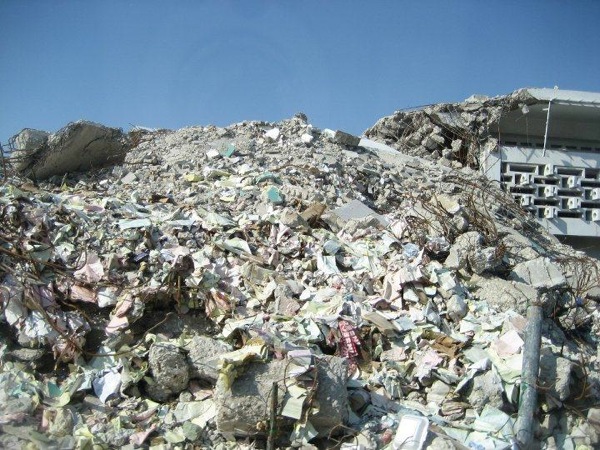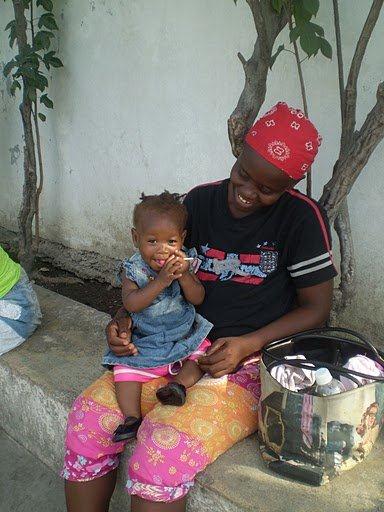
For most of my career, I've been fortunate enough to work with clinicians who heal and who care. Who bring skill and experience, and a frequently unquenchable compassion, into situations that many of the rest of us would do nearly anything to avoid. I may be inclined to exit... while they rush in.
Meet Barbara, a nurse manager from the Visiting Nurse Association of Boston. And here are a few of her photos of her native Haiti. Idyllic and beautiful, as in the sunlit bay above. Tragic and devastating, as in what follows.
Tuesday, January 12, 2010. A catastrophic magnitude 7.0 earthquake with an epicenter only 25 kilometers west of capital city, Port-au-Prince. Ultimately... 316,000 dead. 300,000 injured. 1,000,000 homeless.
And Barbara rushed in.

Here's her story... from the beginning.
Barbara grew up in Carrefour, a suburb of Port-au-Prince, with her mom, a teacher, and dad, an owner of an auto repair business, and brother and sister. It was a happy, largely uneventful time... until her father became sick. Among his ailments, Barbara's father also suffered from decubitius skin ulcers, which then (and even still today in Haiti) were poorly understood. Barbara, then 13 years old, remembers being angry when her father, a proud man who resisted family pressure to move to the United States, told her "not to worry" and that he would be around for "another ten years". Unfortunately, that was not to be the case.
At the age of 16, Barbara and her remaining family members moved to Florida and then eventually to Cambridge, Massachusetts. Barbara and her sister, Beatrice, held a variety of jobs and when Barbara decided she wanted to become a nurse, Beatrice, then a medical assistant, helped her to pay for the training. When Barbara completed nursing school, she began working and then helped to finance Beatrice's nursing education. Barbara continued on to earn her bachelor's degree and is now studying for a master's in health care administration.
Barbara remembers well that day in January, 2010. Reports of an earthquake began surfacing, with no one fully aware of its magnitude or impact. Beatrice called Barbara and gave her an update. It was far worse than expected. Far worse.

Barbara recalls: "We were looking at the news. We couldn't believe it. Nobody knew what was happening. We started calling our family there but no lines were open. We were so worried. We couldn't sleep. We tried calling the UN but couldn't get through. We just didn't know what to do. I was desperate..."
The overwhelming emotion was helplessness. "People there were dying and I thought, I'm a nurse. I have to help." Partners in Health, an organization dedicated to improving the quality and access to health care services in poor and developing areas, called Beatrice on Saturday and asked to deploy her to Haiti on the following Monday. A month later, Barbara's call came.
It was a two week assignment. The lead time was limited. According to Barbara, "you just pack your bag and go."
She recalls departing the airport in Haiti. She remembers looking around at the rubble, the devastation, the places where buildings once stood. "It was tough to see a country you left and is no longer there."
Barbara was stationed at the General Hospital in Port-au-Prince. "Once you got there, the gate was closed and you couldn't leave." And once there, she and her companions worked for 10 days straight, during 7PM to 7AM shifts. Barbara remembers being struck when she saw the former sight of a nursing school next to the hospital which she had seen as a child. "It was no longer there. It was completely flat. I wondered how many people were trapped underneath."
After a quick orientation from the physician-in-charge, Barbara was given a brief tour and was immediately "put to work." She described the first day as "one of the worst days of my life. There were 300 to 400 patients there all needing care... from TB to fractures to missing limbs to wounds... to people who were just dying. Just name it - it was right there looking at you..."
When asked how she responded to that, Barbara describes: "You start to work. Your forget about everything else. You just tried to save everyone you could. You just do whatever you can."

She remembers one young girl at the hospital. She had lost nine members of her family in the tragedy. "She was so thin. You could see only bones. She would not eat or drink... and she never spoke... except at night, she would scream out the names of her family who were now lost to her. I remember seeing a lady who stayed with her. She was from the local church and she slept on the floor, giving the girl a sip of water." Despite their efforts, the patient passed away.
Another patient, a 27 year old woman with renal failure and high blood pressure, was experiencing significant physical and emotional stress. Barbara knew the patient needed oxygen and fast, so she ran down the hall looking for a tank. A simple tank of oxygen. Plentiful in every hospital where Barbara has worked, but scarce in Port-au-Prince's General Hospital. Barbara called out: "This girl's going to die, her heart's going to give out soon... "... and remembers seeing the desperate look in the woman's eyes. The patient said to Barbara: "Please don't leave me. If you leave me, they're going to let me die." Barbara knew she was right.
The patient eventually received the oxygen and the vital dialysis she required and lived.
There was also an older woman patient who "could have been my mother." She had two wounds in her lower legs; "it looked to be a diabetic ulcer". Barbara watched this patient fade from an amiable, even joking, favorite among the nurses, to one who became more and more ill and despondent. At one point, she had no clothing or even sheets, leaving one of the nurses to donate some of her own clothing to the patient. The patient died, alone and in pain. Per Barbara, "there was no reason for her to die that way..."
Barbara looks back at the experience and feels that: "We didn't do enough. There's so much more to do there. And it's not over there. It's terrible what's happening in the tent cities there now. It's just horrible still... but I want to go back."
When asked why she wants to return, Barbara lowered her eyes and said, simply and solemnly: "It's what we do... we are nurses..."
If you're interested in learning more about Partners in Health, please click here.
If you'd like to help, click here.
Posted by Rey
"It's what we do...we are nurses" That statement says it all.
ReplyDeleteThe VNA is lucky to have a person with so much compassion and caring. I don't know too many people that would put their life on hold to help others. Great job BarBara, you are a fine example of being a nurse. keep up the good work
It's wonderful to see story like this one. I agree with the 1st comment, the VNA is lucky to have someone like Barbara. Please keep us updated on Barbara's journey.
ReplyDeleteThat is why I am proud to say I work for the VNA of Boston, and of course, proud to work closely w/ Barbara on the Weekend Team!
ReplyDeleteBarbara, thanks for the work you do and for putting into words and showing a real perspective of what was going on in Haiti and probably still is. We need more giving folks like you and Beatrice your sister in the world. Kuddos to you and God Bless.
ReplyDeleteBarb, I loved you from the moment I met you. You are what true nursing is. You care, your kind you give and give and every ounce of yourself. I miss working with the amazing woman you are. If I am only half as good as you I would be great! Nurses like you make me realize why I do what do. You are a treasure! Love, Kat
ReplyDelete